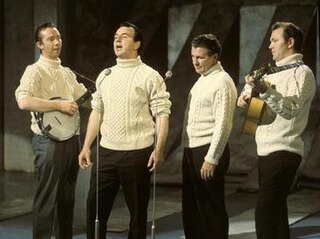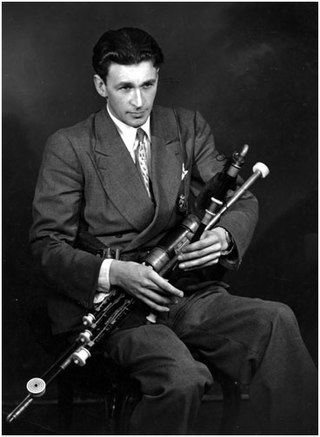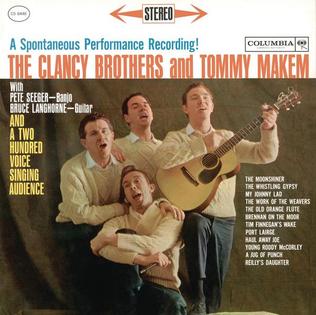Related Research Articles
"Whiskey in the Jar" is an Irish traditional song set in the southern mountains of Ireland, often with specific mention of counties Cork and Kerry. The song, about a rapparee (highwayman) who is betrayed by his wife or lover, is one of the most widely performed traditional Irish songs and has been recorded by numerous artists since the 1950s.

The Clancy Brothers were an influential Irish folk music group that developed initially as a part of the American folk music revival. Most popular during the 1960s, they were famed for their Aran jumpers and are widely credited with popularising Irish traditional music in the United States and revitalising it in Ireland, contributing to an Irish folk boom with groups like the Dubliners and the Wolfe Tones.

Luke Kelly was an Irish singer, folk musician and actor from Dublin, Ireland. Born into a working-class household in Dublin city, Kelly moved to England in his late teens and by his early 20s had become involved in the folk music revival there. Returning to Dublin in the 1960s, he became a founding member of the band The Dubliners in 1962. The Irish Post and other commentators regard Kelly, known for his distinctive singing style and sometimes political messages, as one of Ireland's greatest folk singers.

Patrick Michael Clancy, usually called Paddy Clancy or Pat Clancy, was an Irish folk singer best known as a member of the Clancy Brothers and Tommy Makem. In addition to singing and storytelling, Clancy played the harmonica with the group, which is widely credited with popularizing Irish traditional music in the United States and revitalizing it in Ireland. He also started and ran the folk music label Tradition Records, which recorded many of the key figures of the American folk music revival.

Liam Clancy was an Irish folk singer from Carrick-on-Suir, County Tipperary. He was the youngest member of the influential folk group the Clancy Brothers, regarded as Ireland's first pop stars. They achieved global sales of millions and appeared in sold-out concerts at such prominent venues as Carnegie Hall and the Royal Albert Hall.

Thomas Makem was an Irish folk musician, artist, poet and storyteller. He was best known as a member of the Clancy Brothers and Tommy Makem. He played the long-necked 5-string banjo, tin whistle, low whistle, guitar, bodhrán and bagpipes, and sang in a distinctive baritone. He was sometimes known as "The Bard of Armagh" and "The Godfather of Irish Music".

Séamus Ennis was an Irish musician, singer and Irish music collector. He was most noted for his uilleann pipe playing and was partly responsible for the revival of the instrument during the twentieth century, having co-founded Na Píobairí Uilleann, a nonprofit organisation dedicated to the promotion of the uilleann pipes and its music. He is recognised for having preserved almost 2,000 Irish songs and dance-tunes as part of the work he did with the Irish Folklore Commission. Ennis is widely regarded as one of the greatest uilleann pipers of all time.

The Bruce Springsteen with the Seeger Sessions Band Tour, afterward sometimes referred to simply as the Sessions Band Tour, was a 2006 concert tour featuring Bruce Springsteen and the Sessions Band playing what was billed as "An all-new evening of gospel, folk, and blues", otherwise seen as a form of big band folk music. The tour was an outgrowth of the approach taken on Springsteen's We Shall Overcome: The Seeger Sessions album, which featured folk music songs written or made popular by activist folk musician Pete Seeger, but taken to an even greater extent.
Makem and Clancy was an Irish folk duo popular in the 1970s and 1980s. The group consisted of Tommy Makem and Liam Clancy, who had originally achieved fame as a part of the trailblazing folk group The Clancy Brothers and Tommy Makem in the 1960s. Makem and Clancy sang a combination of traditional Irish music, folks songs from a variety of countries, and newly written pieces, including compositions that Tommy Makem himself wrote. One reporter described their music as "more polished and varied than that used by the Clancy Brothers."
Makem and Spain was an Irish-American folk music band. The band was founded as "The Makem Brothers" in February 1989 by Rory, Shane, and Conor Makem, the three sons of "The Godfather of Irish Music" Tommy Makem, and grandsons of Irish source singer Sarah Makem.
Sarah Makem a native of Keady, County Armagh, Northern Ireland, was a traditional Irish singer. She was the wife of fiddler Peter Makem, mother of musicians Tommy Makem and Jack Makem, and grandmother of musicians Tom Sweeney, Jimmy Sweeney, Shane Makem, Conor Makem and Rory Makem. Sarah Makem and her cousin, Annie Jane Kelly, were members of the Singing Greenes of Keady.
"Carrickfergus" is an Irish folk song, named after the town of Carrickfergus in County Antrim, Northern Ireland. The Clancy Brothers' 1964 album titled "The First Hurrah!" includes this title. A somewhat differing version was released under the name "The Kerry Boatman", by Dominic Behan on an LP called The Irish Rover, in 1965.
"I Know My Love" is a traditional Irish folk song, which was first collected by Herbert Hughes and published by Boosey & Hawkes in 1909, in Volume 1 of "Irish Country Songs" - although the song is likely to be considerably older than that. The book can be viewed or downloaded as a PDF here.
Tradition Records was an American record label from 1955 to 1966 that specialized in folk music. The label was founded and financed by Guggenheim heiress Diane Hamilton in 1956. Its president and director was Patrick "Paddy" Clancy, who was soon to join his brothers Liam and Tom Clancy and Tommy Makem, as part of the new Irish folk group, The Clancy Brothers and Tommy Makem. Liam Clancy designed the company's maple leaf logo. Columbia University Professor of Folklore Kenneth Goldstein was also involved in the early creation of the company, which operated out of Greenwich Village, New York, United States.
Diane Hamilton was the pseudonym of Diane Guggenheim (1924–1991), an American mining heiress, folksong patron and founder of Tradition Records.

Bruce Springsteen with The Sessions Band: Live in Dublin is a 2007 video and audio offering that captures in-concert performances from the Bruce Springsteen with The Seeger Sessions Band Tour recorded in November 2006 at The Point Theatre in Dublin, Ireland. The release consists of a concert DVD, a Blu-ray Disc, and separate two-CD audio set. A "special edition" of the CD set includes the concert DVD as well. The album is dedicated to friend and Irish show-business giant, Jim Aiken.

Robbie O'Connell is an Irish singer songwriter who performs solo, as well as with The Green Fields of America. He also appears with Dónal Clancy (cousin), Dan Milner, and fiddler Rose Clancy. O'Connell has also toured and recorded with The Clancy Brothers, being their nephew. For over 20 years, he has conducted small cultural tours to Ireland with Celtica Music & Tours and, for more than ten years, WGBH Learning Tours. Married with four grown children, he now spends his time between Bristol, Rhode Island and Waterford.

A Spontaneous Performance Recording!: The Clancy Brothers and Tommy Makem, sometimes simply called A Spontaneous Performance, is a 1961 collection of traditional Irish folk songs performed by The Clancy Brothers with frequent collaborator Tommy Makem. It was their first album for Columbia Records. The group would continue to record for Columbia for the remainder of the 1960s. The album was nominated for a Grammy Award in 1962 for Best Folk Recording.
References
- ↑ Loesberg, John (2005). Folksongs and Ballads Popular in Ireland, Volume 3. Cork: Ossian. ISBN 978-0-946005-02-4.
- ↑ O'Lochlainn, Colm (1939). Irish Street Ballads. Three Candles Press.
- ↑ Gogan, Robert (2005). 50 Great Irish Fighting Songs. Dublin: Music Ireland. ISBN 978-0953206872.
- ↑ Ennis, Seamus (1951-01-14). Mrs. McGrath (My Son Ted) (MP3). Dublin: Association for Cultural Equity . Retrieved 2021-03-17.
- 1 2 Jones, Steven L. (20 June 2015). "You Can't Win a Race with a Cannonball: Goya, Guernica & My Son John". Sing Out! . Archived from the original on 2018-09-09.
- ↑ "My Son John on Mudcat.org" . Retrieved 7 February 2024.
- ↑ "My Son John" . Retrieved 7 February 2024.
- ↑ "A Folk Song A Day: Song List". 12 October 2016. Retrieved 24 January 2024.
- ↑ "365 Days Of Folk: Song List" . Retrieved 24 January 2024.